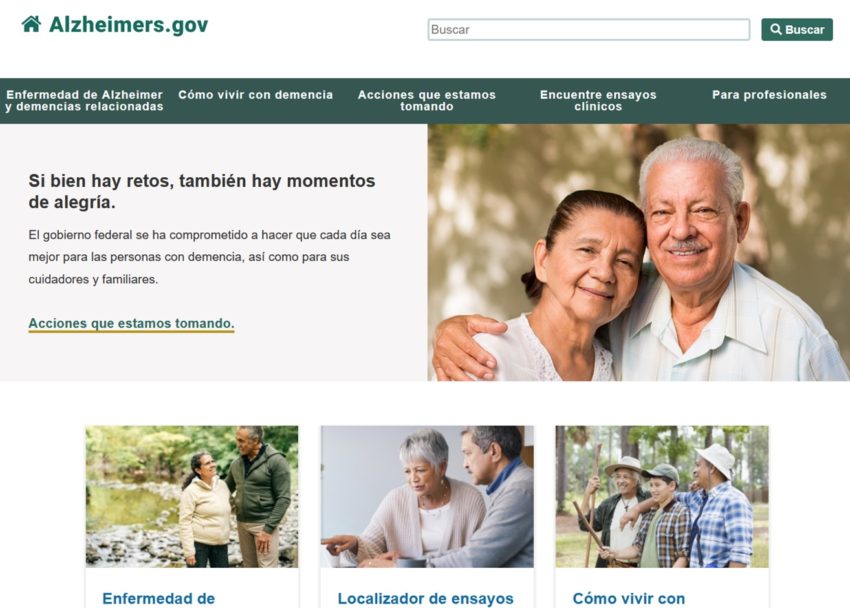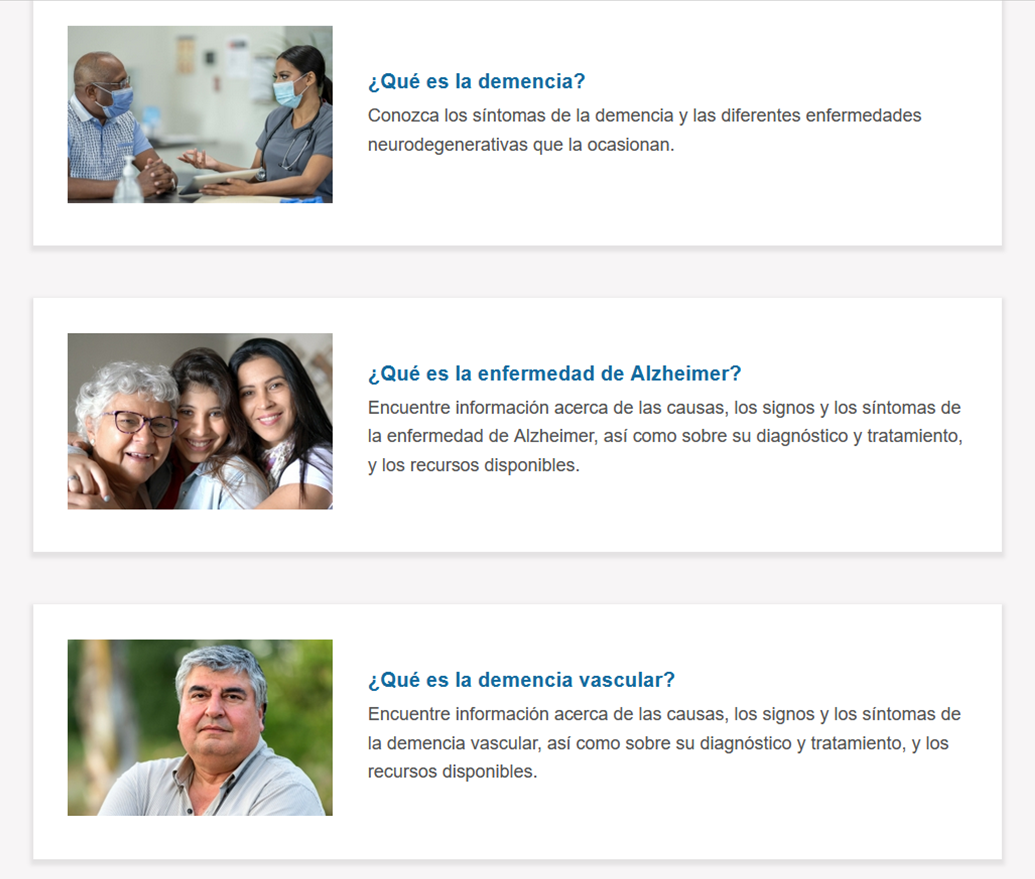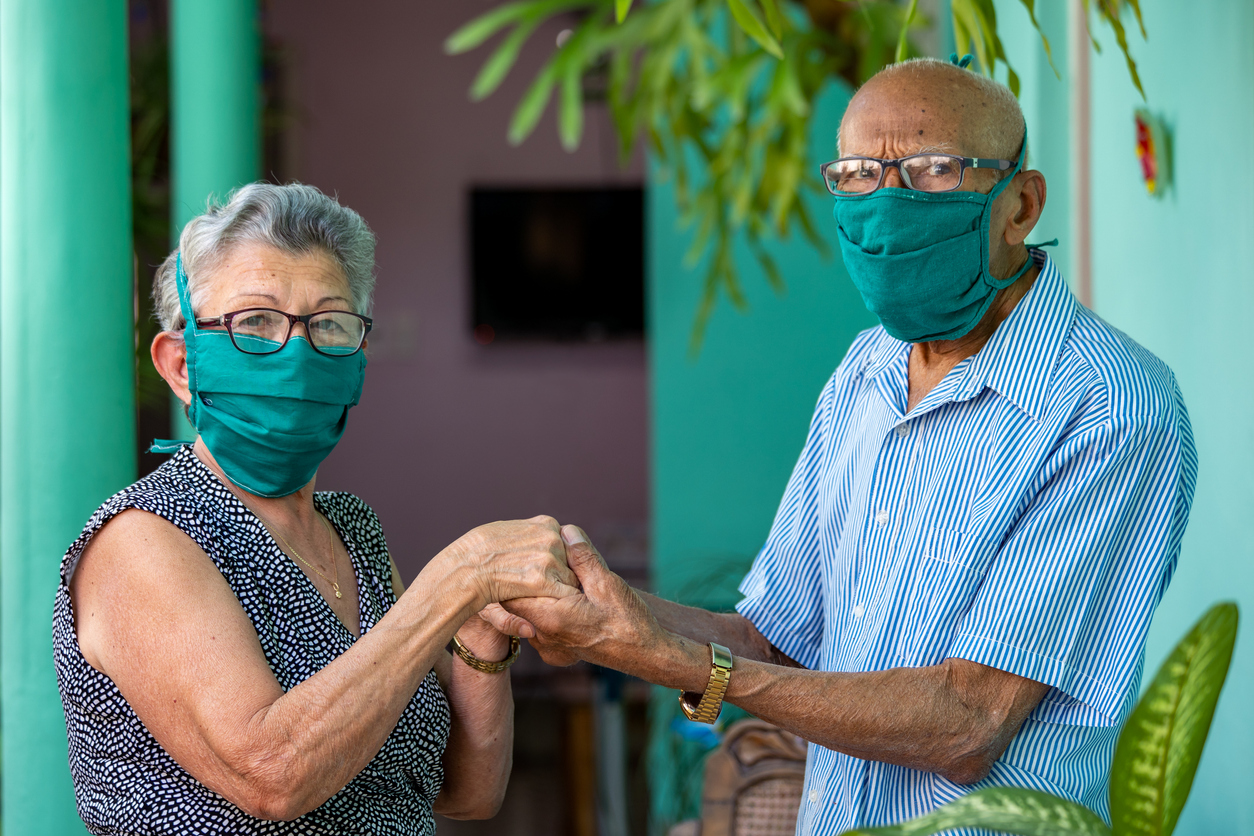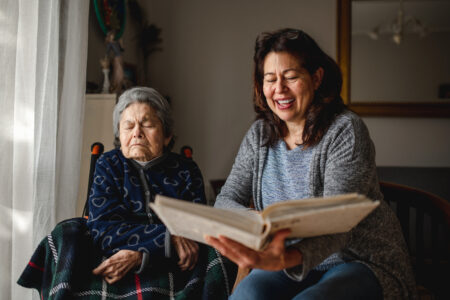
Share On Social!
Did you know that every 65 seconds, someone develops Alzheimer’s disease?
This number is most troubling for Latinos and women.
Latinos overall are 1.5 times more likely to develop Alzheimer’s than their White peers. Two-thirds of Alzheimer’s patients are women. Latinas are at higher risk than non-Latinas.
In response, the federal government created a website, Alzheimers.gov, for dementia information, resources, and clinical trials.
 Now that website is also in Spanish at Alzheimers.gov/es!
Now that website is also in Spanish at Alzheimers.gov/es!
Each website has:
- Information about Alzheimer’s disease and related dementias, including causes, symptoms, diagnosis, and treatment.
- Knowledge and resources for caregivers and people living with dementia.
- Clinical trials and studies that people can join to help advance ways to treat and reduce the risk of Alzheimer’s disease.
- Resources for health care providers, community and public health workers, and researchers.
- Updates on what the federal government is doing to address Alzheimer’s and related dementias.
“Whether you are living with dementia, a family member or friend, health care provider or other health care professional, researcher, or advocate, Alzheimers.gov is designed for you,” according to the website.
View and share the website today!
What Is the Issue with Alzheimer’s and Latinos?
Latinos living with Alzheimer’s are projected to grow from 430,000 in 2014 to 3.2 million in 2060.
That is more than an alarming seven-fold increase.
Alzheimer’s is already our nation’s costliest disease, paid mostly by Medicare and Medicaid. A recent report signals this tab could skyrocket in the future as the Latino older adult population grows from approximately four million today to more than 20 million in 2060.
Latinos are also at risk for Alzheimer’s because of medical conditions that are considered risk factors for developing Alzheimer’s – like high blood pressure, stroke, and heart disease – which are all prevalent among older Latinos.
Women of color, including Latinas, face higher rates of Alzheimer’s than white women. This is due to genetics, lifestyle, and socioeconomic risks.
Aging poses the most considerable risk for developing the disease. Latinos are one of the youngest populations in the U.S., meaning this problem will worsen as they age.
Lifestyle and socioeconomic choices are also among the factors that affect disease prevalence in Latinos.
Alcoholism is a growing health crisis in the Latino community. Worse, many studies suggest that alcohol consumption can also influence the development of Alzheimer’s disease.
The considerable duration of Alzheimer’s disease contributes to broader public health impacts, mainly due to the time spent in a state of disability and dependence.
Why Is Alzheimer’s Information in Spanish So Important?
Large numbers of Latino elders who are most at risk of Alzheimer’s are first-generation immigrants who are not necessarily comfortable in English or trusting of a health care system.
Language barriers prevent some Latino families from being in the know about Alzheimer’s and clinical trials.
 The lack of Spanish-language capability and the cultural insensitivity in many health and community care systems creates mistrust in Latino elders, limits access to care, and adversely affects the quality of the care they do receive.
The lack of Spanish-language capability and the cultural insensitivity in many health and community care systems creates mistrust in Latino elders, limits access to care, and adversely affects the quality of the care they do receive.
Public health leaders are speaking up on important Alzheimer’s information in Spanish.
In Latino culture, family is the center of life. As Latino parents age, children are often expected to become their caregivers.
1 in every 3 U.S. Latino households has at least one family caregiver. These Latino caregivers juggle jobs or leave the workforce to care for aging family members.
Hence, it is critical to improve the access to Alzheimer’s caregiving resources and training for informal caregivers in Spanish.
How Can Clinical Trials Help Latinos Deal with Alzheimer’s?
The government’s new Alzheimers.gov/es website provides information on clinical trials.
Clinical trials are studies that help researchers learn and find new ways to help slow, manage, and treat Alzheimer’s and related dementia.
You can find an Alzheimer’s clinical trial near you in Spanish or English.
In San Antonio, volunteer for:
- An Alzheimer’s disease clinical trial at the Glenn Biggs Institute for Alzheimer’s and Neurodegenerative Diseases at UT Health San Antonio.
- The REACH trial; for each visit, volunteers are eligible for $100.
- The AHEAD trial; for each visit, volunteers are eligible for $50.
Also, Dr. Amelie G. Ramirez’s Salud America! program at UT Health San Antonio is sharing the stories of clinical trial heroes like Emilia Asto-Flores, Elsada Wilson, and Alma Lopez, with the support of Genentech, a member of the Roche Group.
We are using these stories to fuel Latino-focused recruitment strategies and systems for clinical trials in cancer treatment and Alzheimer’s disease.
To share your story, or share someone we could contact for a story, email Salud America! Digital Content Curators Josh McCormack or Dr. Pramod Sukumaran.
“It is vital for Latinos to participate in clinical trials,” Ramirez said. “This kind of research can go on to save the lives of countless people. But in order for that to become a reality, we need to see accurate, equitable representation in clinical trials. One way Latinos can help is by signing up to participate in a clinical trial.”
By The Numbers
142
Percent
Expected rise in Latino cancer cases in coming years



